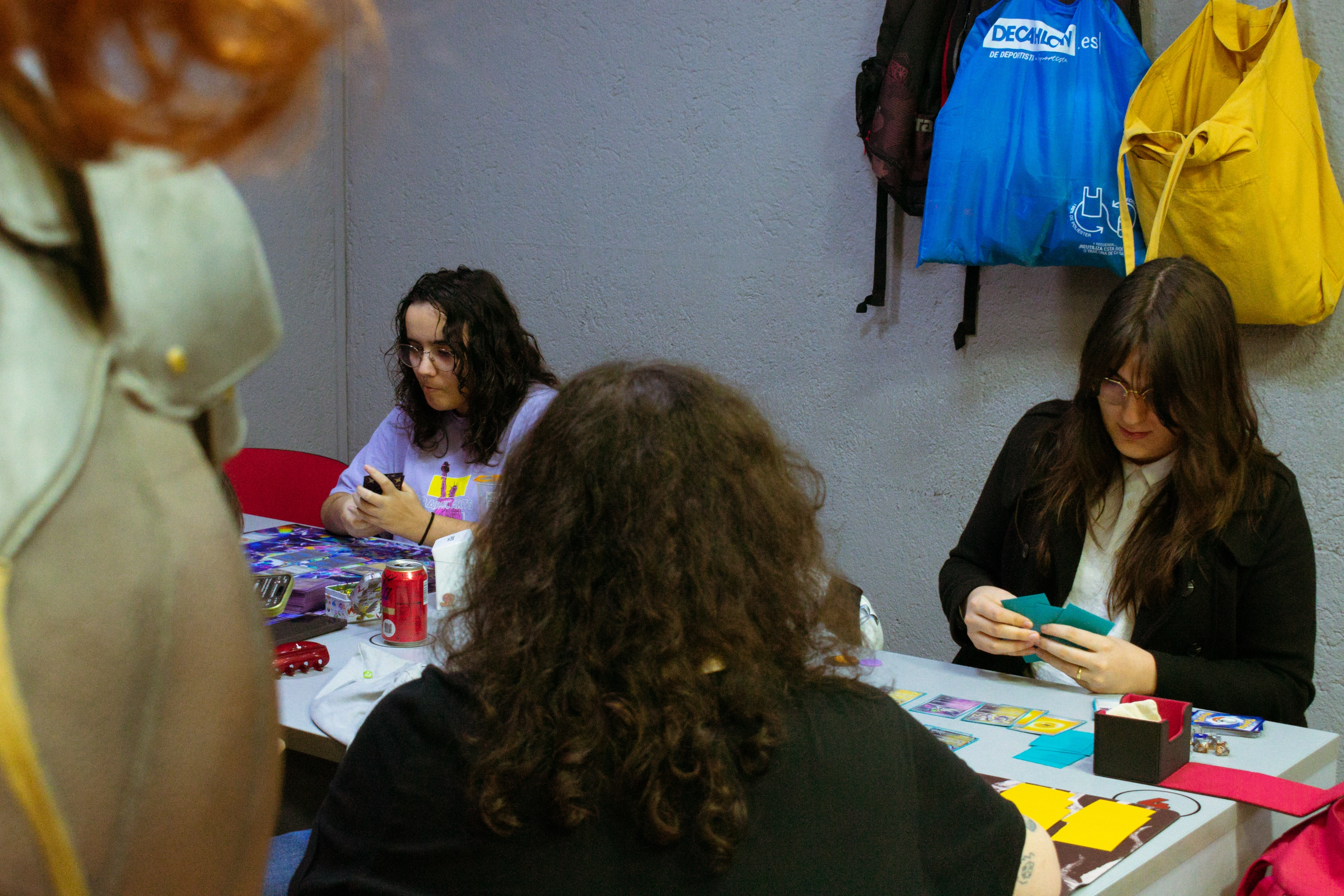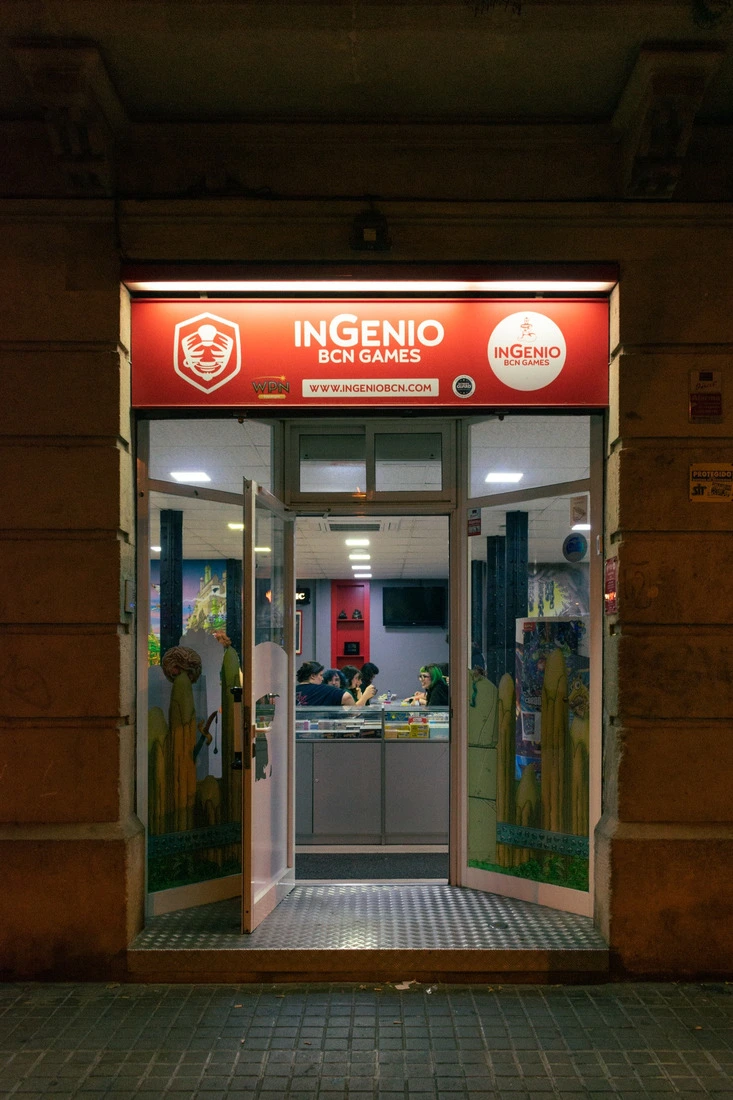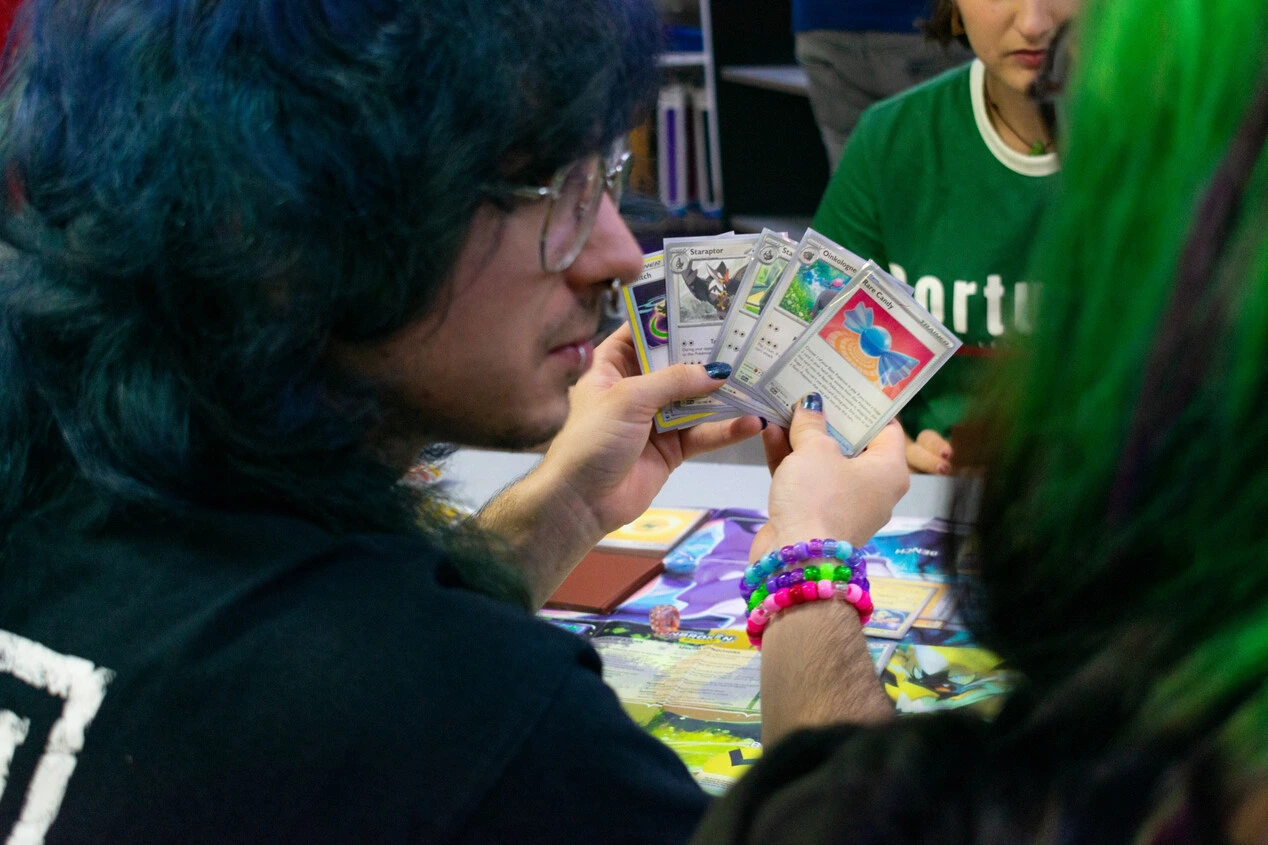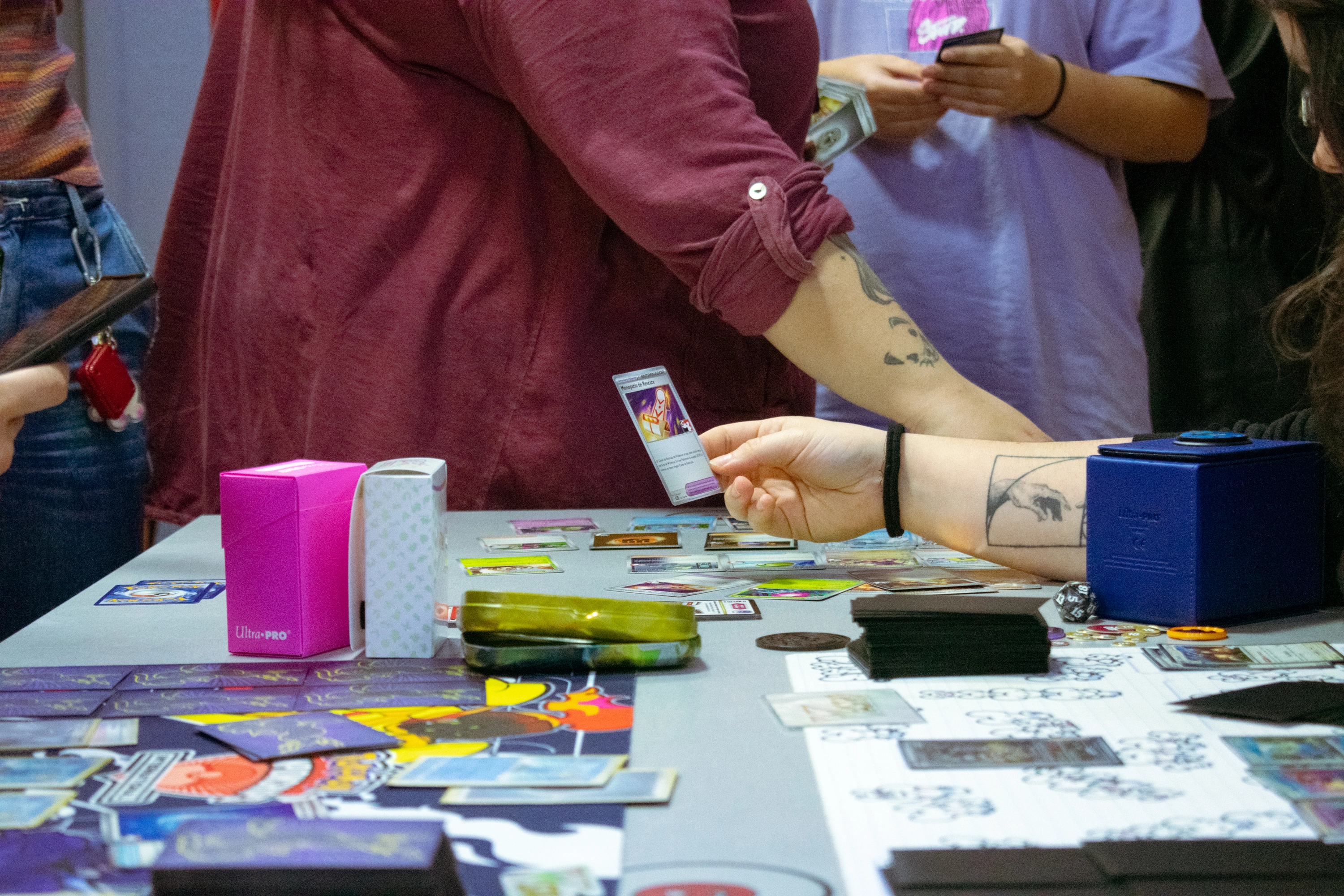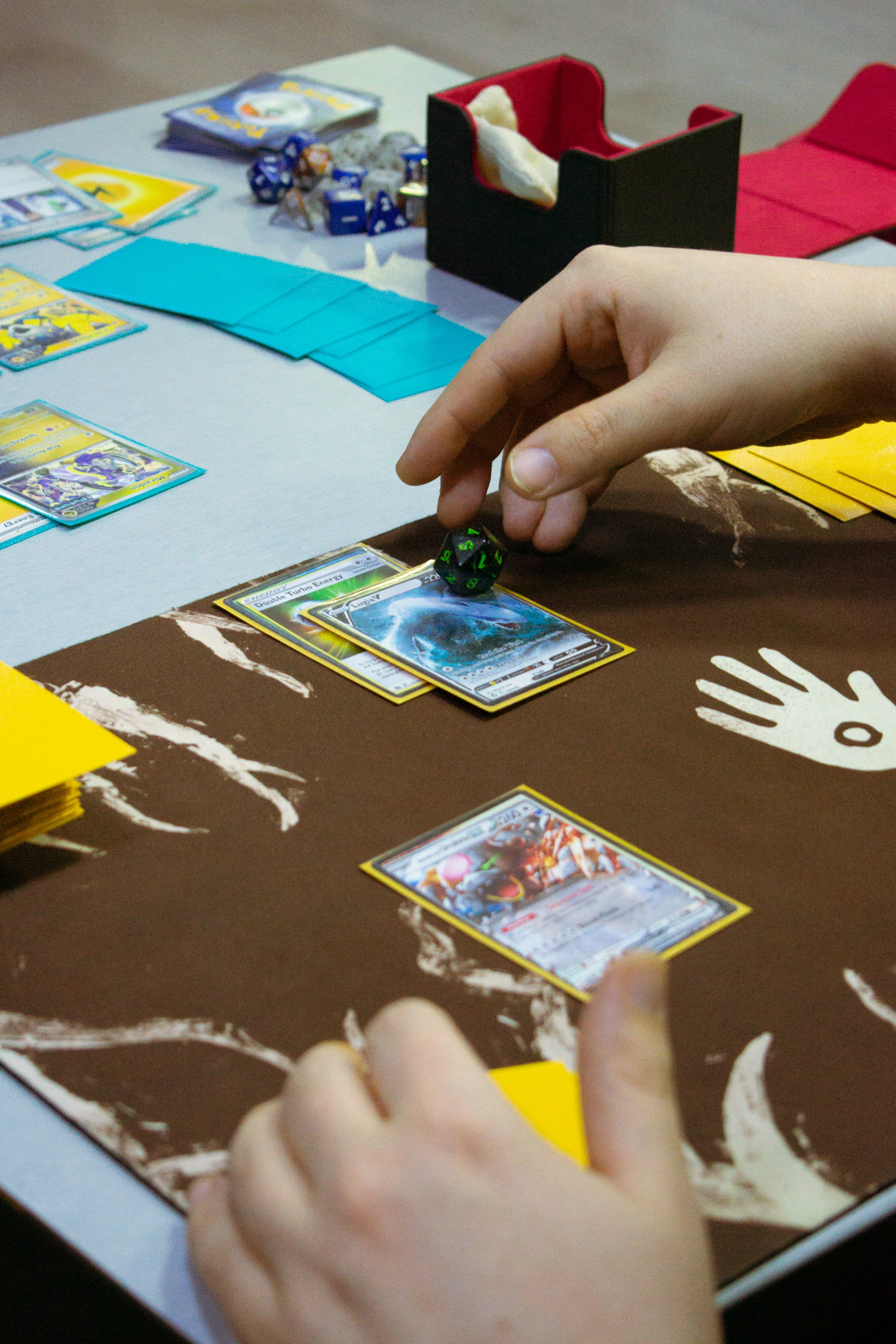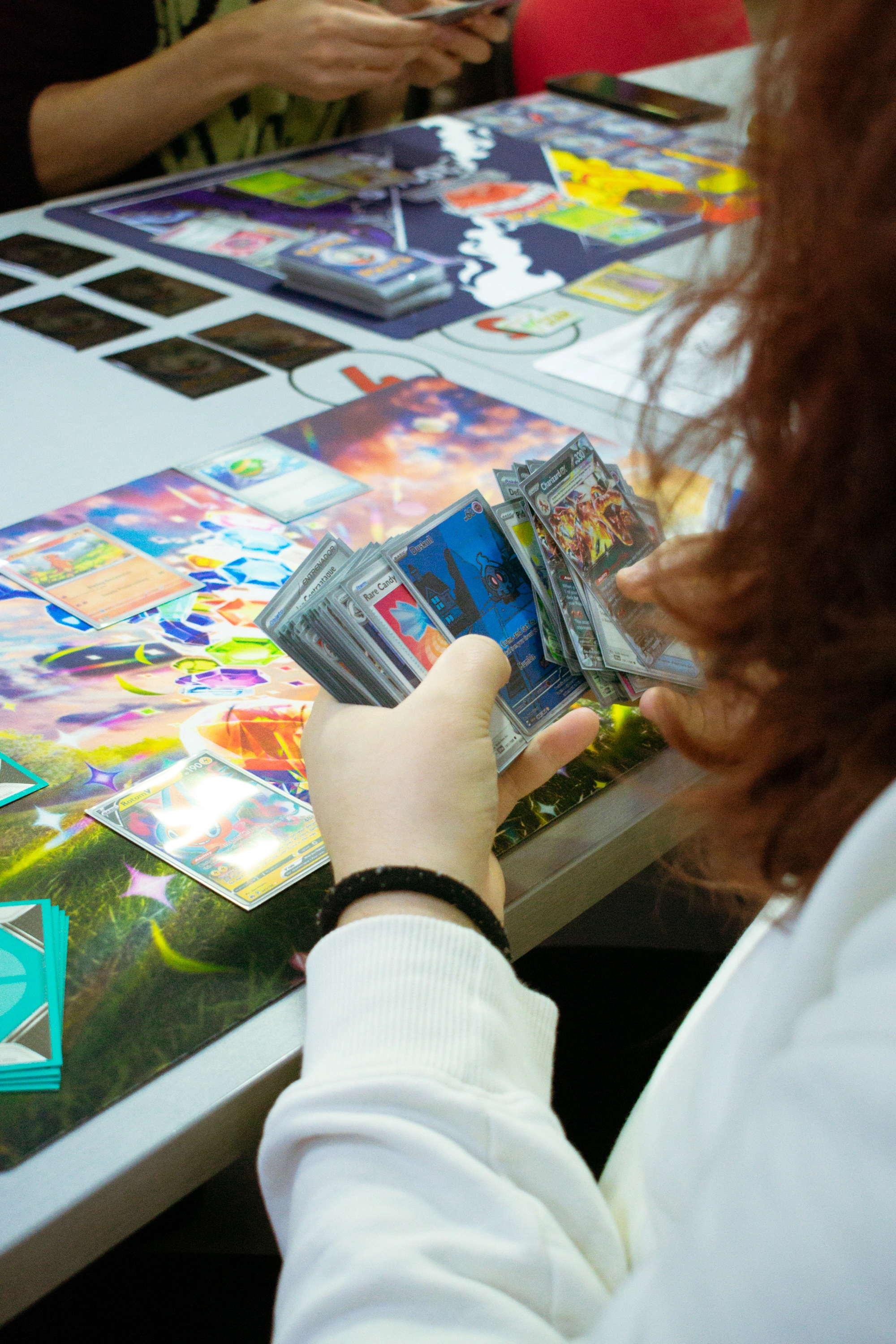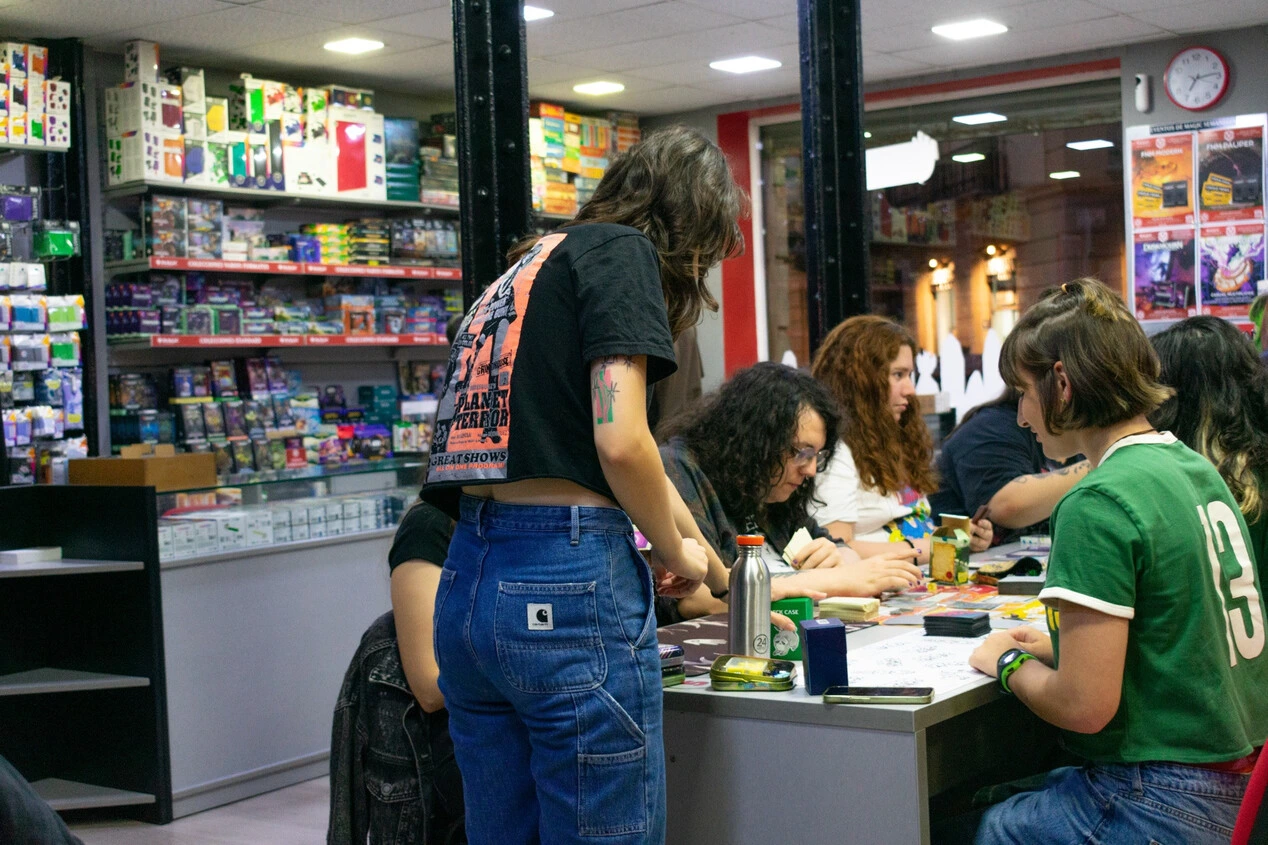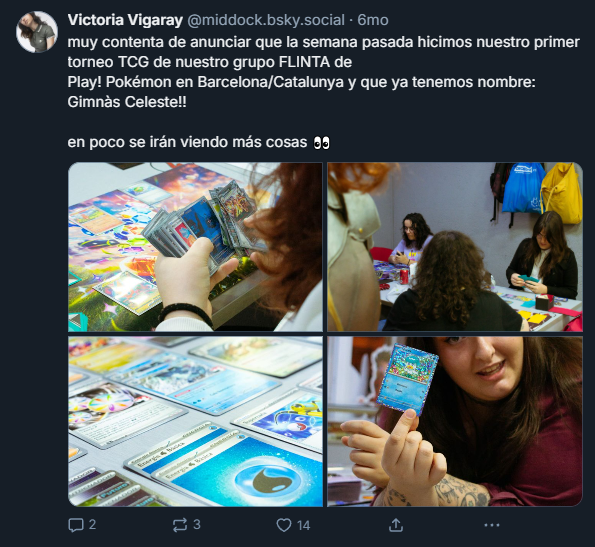Pokémon TCG community
That aims to create a safe space to learn to play the game, and thus, increase the number of FLINTA (Female, Lesbian, Intersex, Nonbinary, Trans and Agender) individuals inside the overall Pokémon TCG community in Barcelona and Catalonia.
Photos by Jota Jerez
Creating a safe space
I came up with the idea and spoke with the Pokémon League Owner at Ingenio BCN Games to create an event that explained the game from the very start, aiming to make it accessible to people that are not even that familiar with trading card games or tabletop games in general, but they are keen on Pokémon or enjoy collecting cards.
Creating a safe space
Traditionally, women and minorities have been relegated from the gaming space and more particularly from the competitive side. From my perspective, this is due to culturally ingrained ideas about femininity and masculinity and what spaces and activities are expected by each gender to inhabit.
My hypothesis was that providing a blank slate for these individuals they could learn the knowledge gaps that they could’ve missed from being isolated from the gaming/competitive space and even enter the “standard” ones. It was proved to be true, as some of the members started going to these tournaments and events after a while.
Staggered onboarding
I used my knowledge from designing Rainbow Six Siege’s onboarding to apply what I like to call learning layers. As a onboarded player myself, I perceived there was a huge gap between the knowledge that was taught from the 30-card initial decks provided by Pokémon and the actual game everyone else was playing.
This experience gave me the impulse of creating a 4-phase onboarding that took place in several sessions, instead of the classic “Learn the basics and then go home and learn the rest on your own.”
Staggered onboarding
The phases mentioned above consisted of:
1. A number of matches with 30-card decks until they felt confident to go on to the next step. A few mechanics were explained here: Pokémon, evolutions, active/bench placement, energies and attacks, weaknesses, items and supporters.
2. A number of matches with 40-card decks until they felt confident to go on to the next step. The rest of the mechanics were explained here (abilities, stadiums and resistances), but the most important thing here was to start explaining the dynamics (search engines, energy acceleration and basic synergies.)
Staggered onboarding
3. Playing with standard 60-card decks. Once they played a few, we started covering the basics of deckbuilding going further with synergies and understanding why decks are built the way they are (e.g., explaining statistic optimization and such.) Iteration was handled one-on-one, playing matches and “correcting” the deck every time it was needed.
4. Once they felt comfortable with standard decks, we started covering meta concepts such as deck rotation, tournament rules, how to counter specific decks and so on. Mock tournaments took place to understand the pacing & behavior in a less aggressive space.
Community build-up
By doing a method that required several days it also thrived social relationships between the members and started to create a community: it also was more engaging than the other method as members could play with other players that were on their level of knowledge.
This was frontally opposed to what was happening in normal Pokémon Leagues around Barcelona and Catalonia, where new players, specially from unconventional backgrounds, were sometimes heavily discouraged to keep playing if they didn’t have previous friends to play with or felt too unskilled.
Community build-up
Acted as community owner initially helped by the League Owner rep, and later on became more independent once I grokked the processes.
Coordinated volunteers, members and schedule in these sessions and communicated with the shop assistants about everything related to materials and events.
I also created a Glossary for the members to check every time they needed more information in the game or missed a session.
From the bottom of my heart, I truly believe that the best part of this initiative was to see people reconnect with a long lost hobby (TCGs), seeing them being passionate about the game, having a space to hang out and meeting new people in the process.
Pokémon TCG community
That aims to create a safe space to learn to play the game, and thus, increase the number of FLINTA (Female, Lesbian, Intersex, Nonbinary, Trans and Agender) individuals inside the overall Pokémon TCG community in Barcelona and Catalonia.
Photos by Jota Jerez
Creating a safe space
I came up with the idea and spoke with the Pokémon League Owner at Ingenio BCN Games to create an event that explained the game from the very start, aiming to make it accessible to people that are not even that familiar with trading card games or tabletop games in general, but they are keen on Pokémon or enjoy collecting cards.
Creating a safe space
Traditionally, women and minorities have been relegated from the gaming space and more particularly from the competitive side. From my perspective, this is due to culturally ingrained ideas about femininity and masculinity and what spaces and activities are expected by each gender to inhabit.
My hypothesis was that providing a blank slate for these individuals they could learn the knowledge gaps that they could’ve missed from being isolated from the gaming/competitive space and even enter the “standard” ones. It was proved to be true, as some of the members started going to these tournaments and events after a while.
Staggered onboarding
I used my knowledge from designing Rainbow Six Siege’s onboarding to apply what I like to call learning layers. As a onboarded player myself, I perceived there was a huge gap between the knowledge that was taught from the 30-card initial decks provided by Pokémon and the actual game everyone else was playing.
This experience gave me the impulse of creating a 4-phase onboarding that took place in several sessions, instead of the classic “Learn the basics and then go home and learn the rest on your own.”
Staggered onboarding
The phases mentioned above consisted of:
1. A number of matches with 30-card decks until they felt confident to go on to the next step. A few mechanics were explained here: Pokémon, evolutions, active/bench placement, energies and attacks, weaknesses, items and supporters.
2. A number of matches with 40-card decks until they felt confident to go on to the next step. The rest of the mechanics were explained here (abilities, stadiums and resistances), but the most important thing here was to start explaining the dynamics (search engines, energy acceleration and basic synergies.)
Staggered onboarding
3. Playing with standard 60-card decks. Once they played a few, we started covering the basics of deckbuilding going further with synergies and understanding why decks are built the way they are (e.g., explaining statistic optimization and such.) Iteration was handled one-on-one, playing matches and “correcting” the deck every time it was needed.
4. Once they felt comfortable with standard decks, we started covering meta concepts such as deck rotation, tournament rules, how to counter specific decks and so on. Mock tournaments took place to understand the pacing & behavior in a less aggressive space.
Community build-up
By doing a method that required several days it also thrived social relationships between the members and started to create a community: it also was more engaging than the other method as members could play with other players that were on their level of knowledge.
This was frontally opposed to what was happening in normal Pokémon Leagues around Barcelona and Catalonia, where new players, specially from unconventional backgrounds, were sometimes heavily discouraged to keep playing if they didn’t have previous friends to play with or felt too unskilled.
Community build-up
Acted as community owner initially helped by the League Owner rep, and later on became more independent once I grokked the processes.
Coordinated volunteers, members and schedule in these sessions and communicated with the shop assistants about everything related to materials and events.
I also created a Glossary for the members to check every time they needed more information in the game or missed a session.
From the bottom of my heart, I truly believe that the best part of this initiative was to see people reconnect with a long lost hobby (TCGs), seeing them being passionate about the game, having a space to hang out and meeting new people in the process.
